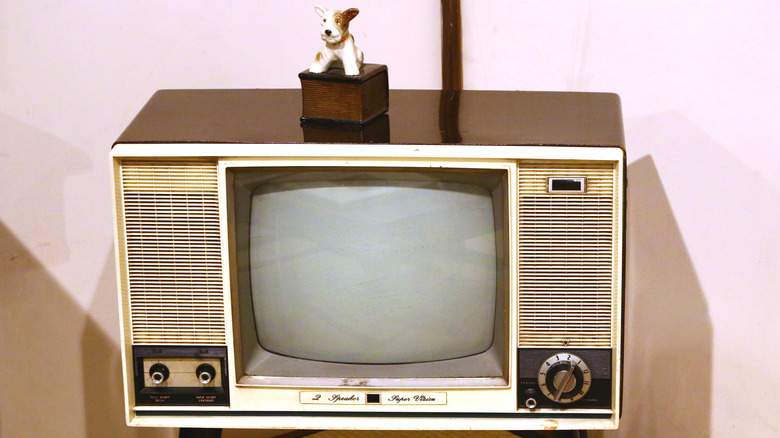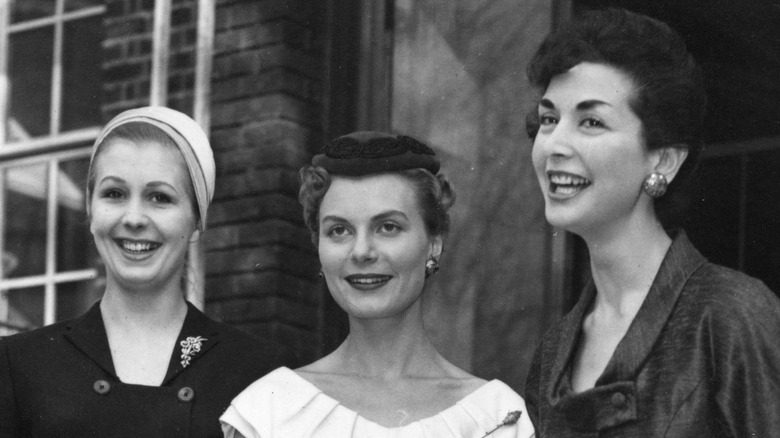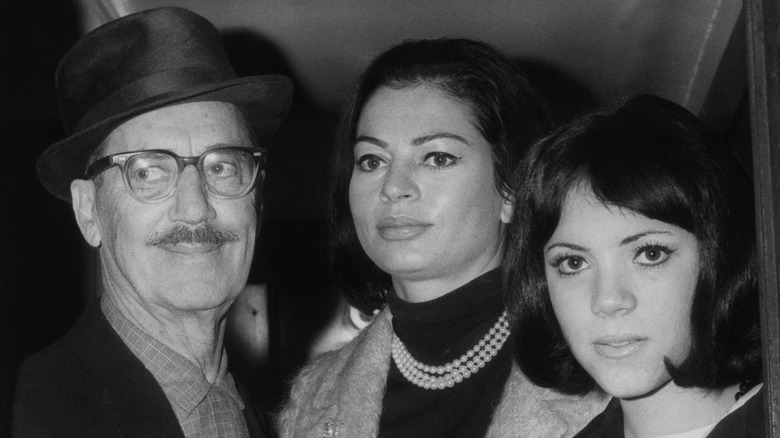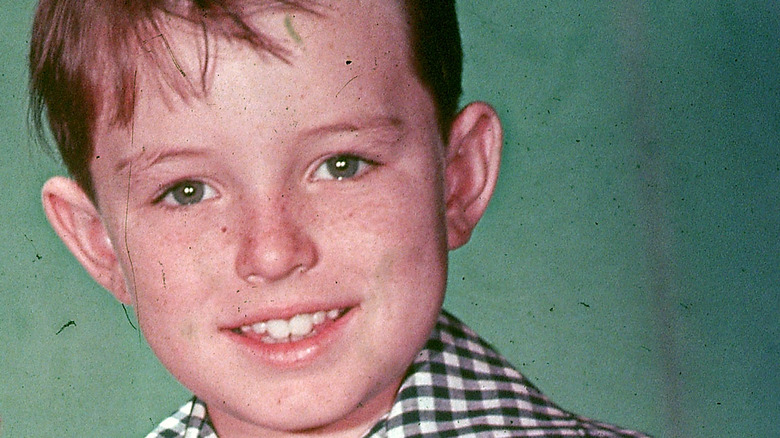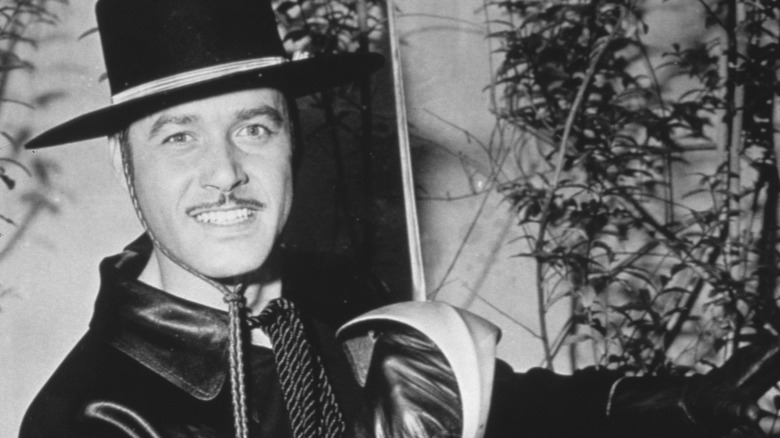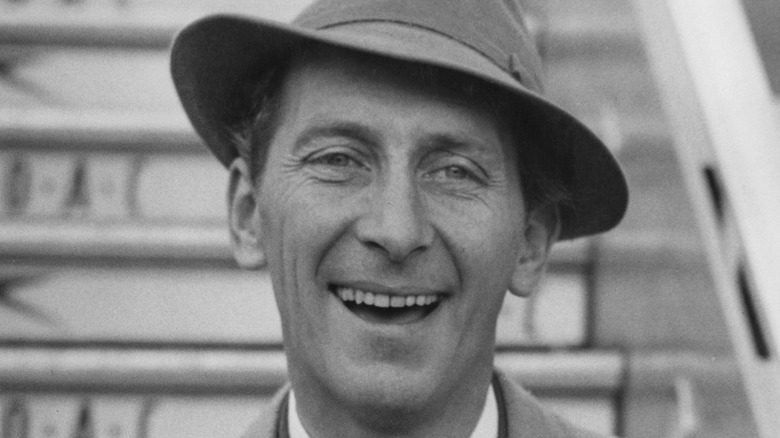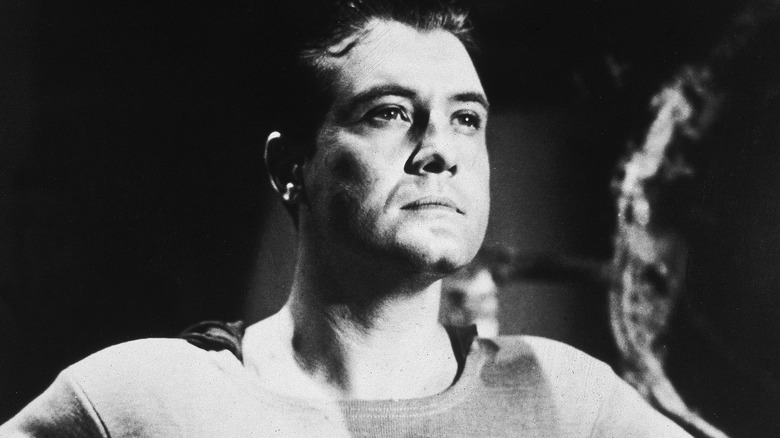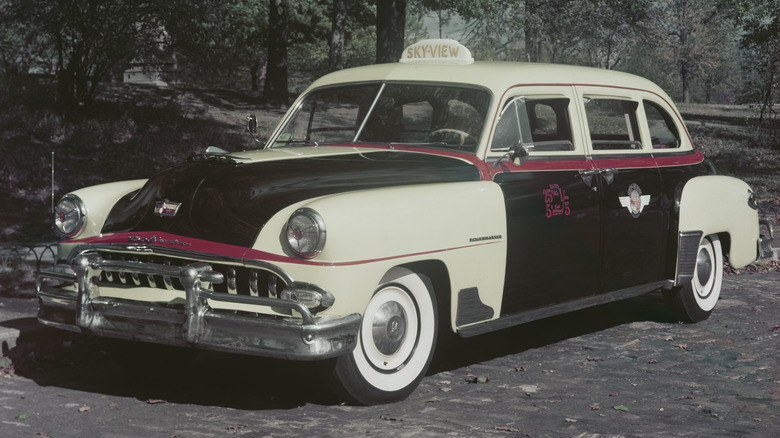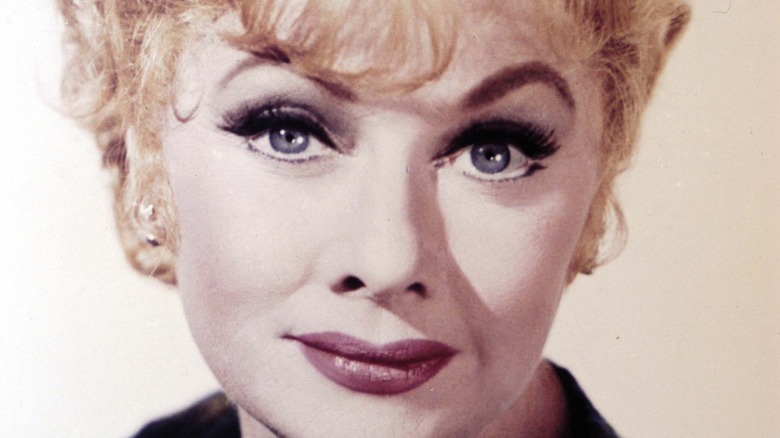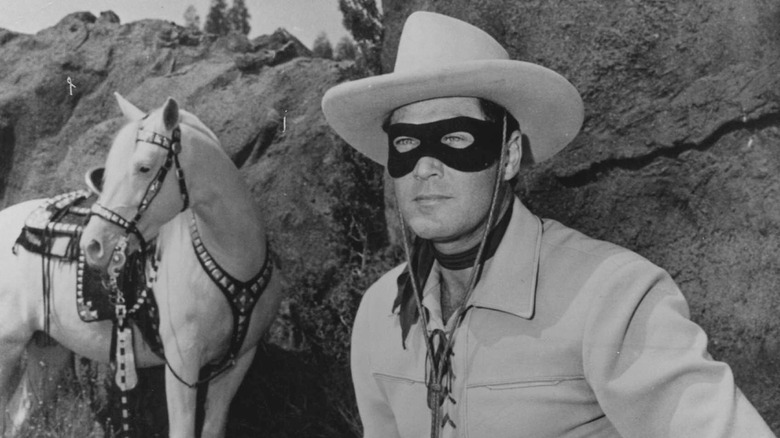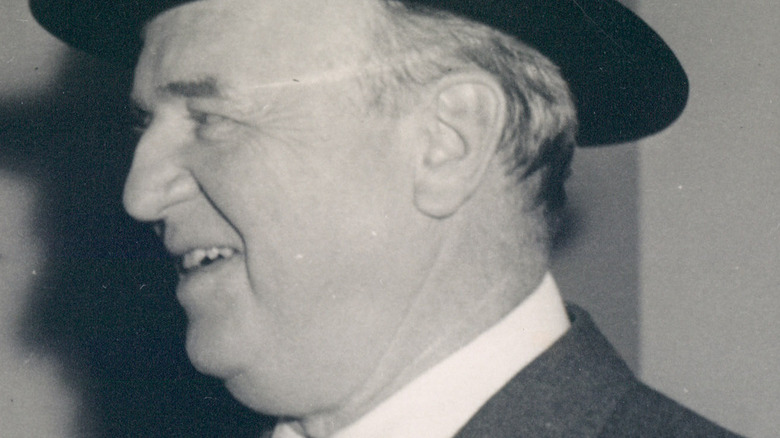The Dark Side Of Being A 1950s TV Star
There's been plenty of talk over the past few years about living through a golden age of television, but the 2010s weren't the first decade to be designated as such. If a golden age is defined as the height of quality and influence, today might have a better claim to the former aspect, depending on individual tastes. But in the 1950s, television could truly be said to revolutionize art and entertainment.
As a mark of how rapidly television expanded during the '50s, consider the ownership numbers. Per Britannica, televisions were found in a mere 2% of American homes before the '50s, but by the decade's midway point, televisions had invaded the homes of 70% of Americans. Even those who didn't own a set could often be found gathered around storefront displays, so powerful was the allure of this new medium that could visually broadcast news reports and live events all across the country.
The reputation of scripted material on television grew at a slower pace. Film, radio, and the stage commanded the attention of most established talent, and the '50s shows that have stood the test of time were a choice few productions set apart from largely amateurish and experimental efforts — an inevitability in a young medium. But some facts about show business are true no matter the decade. And one of those facts is that performers can run into hard times. Here are a few of the misfortunes of 1950s TV stars.
You might have deceived millions of viewers
Is any form of entertainment serious enough business to warrant a congressional investigation? It may sound absurd, but a 1950s TV scandal attracted the attention of America's federal legislative branch. Among the most popular genres in the early days of television, according to History, was the quiz show. An import from radio, quiz shows moved from fun stunts to big money after 1954 when the Supreme Court ruled that such prizes wouldn't run afoul of gambling laws.
"The $64,000 Question," "Twenty-One," "Dotto," and others put questions to players with stakes of handsome sums. Beyond the appeal of the game itself, charismatic contestants with outstanding luck and knowledge won audiences' hearts. But wins and losses weren't entirely due to chance or skill. It was a widespread practice among quiz shows to rig the game, albeit in different ways. Some shows deliberately tried to knock players out of the competition, while others threw the game based on whatever was best for ratings.
The scale of rigging in the genre came to light when a former "Dotto" contestant revealed that the show gave away answers. That was Congress' cue to step in. According to PBS, their investigation didn't end with much in the way of punishment; it may have violated the spirit of a fair game, but rigging a game show wasn't illegal. However, Congress did make it so in time for the next decade through an amendment to the Communications Act.
Your dad might pull you on stage against your will
The Marx Brothers were America's comedy darlings in the 1930s, and they still get laughs today. But after retiring from movie screens, only one of the brothers made it big in television. Groucho Marx, the acerbic wit with the greasepaint mustache, lucked into a role hosting the radio quiz show "You Bet Your Life" in the 1950s, and followed the program into TV (per PBS). However, to call "You Bet Your Life" a quiz show might be misleading. The series was inspired by Marx's ill-tempered improvising in a sketch with Bob Hope, and more emphasis was placed on his repartee with the contestants than on the game itself, according to the documentary "The One, The Only...Groucho."
A beloved entertainer himself and the brother of other beloved entertainers, Marx hoped to bring the younger generation of the family into show business. He doted on his youngest daughter, Melinda Marx, particularly after his divorce from Melinda's mother. He also took notice of young Melinda's song and dance abilities and decided to feature them on "You Bet Your Life." The only problem, according to Stefan Kanfer's "Groucho: The Life and Times of Julius Henry Marx," was that Melinda only thought of singing and dancing as a lark. Made to perform before millions, she became increasingly disenchanted and terrified, a fact her father was very late in realizing. Per Kanfer, she eventually ran away from home.
You may have contributed to worsening racial tension in America
Anyone who watches a sitcom, soap opera, or HBO movie and thinks, "that is an unadulterated look at real life," has issues with credulousness. Artifice is baked into fiction by its nature, but television can reflect certain realities of society, even if unintentionally. And much of 1950s American television reflected a society that was marked by its homogeneity.
Show business was not the most diverse profession in the 1950s. The same could be said of America at large in the '50s, but in assessing the TV output of the decade, Alan Nadel argued that the new medium made things worse. In his book "Television in Black-and-White America: Race and National Identity" (via the Chicago Tribune), Nadel said that the limited number of networks, emphasis on conformity, and absence of diversity reinforced an image of ideal American life that excluded non-white populations and spread that image around the world as what America should be.
Nadel's case could be challenged by a look at the strides made during the '50s by non-white actors, and by the efforts of certain high-profile programs. Writing about the decade's TV in the New Haven Register, Paul Keane noted how unfriendly it could be to women, ethnic minorities, and LGBTQ people. But he also found examples of progress in various programs, from the mixed marriage on "I Love Lucy" to depictions of women doctors and Native groups in "Death Valley Days."
You could lose your hit show thanks to network squabbling
Television doesn't offer the most secure employment to actors. Few pilots make it onto the air, and few series last long enough to find an audience. If a show has the good fortune to become a hit, the star might have reason to think that they'll have a steady job for a few years, but even in that situation, show business can be fickle.
Consider the example of Guy Williams. For the baby boomer generation, Williams's dashing smile and fencing prowess brought California's legendary outlaw Zorro to life through the 1957 television program of the same name. "Zorro" was produced by Walt Disney, who offered the series to ABC as part of a deal to secure financing for Disneyland (per Sandra Curtis's "Zorro Unmasked"). Once the park was up and running, Williams and the rest of the cast put in personal appearances during "Zorro Days" (per the Walt Disney Family Museum), and the series — produced on a lavish scale for the time — was a hit with viewers.
Williams delighted in playing Zorro and expected, after the second season wrapped, to be back in the mask within months. But according to "Zorro Unmasked," ABC was no longer willing to put up money for expensive shows like "Zorro" when they could produce their own content in-house at a better price. Disney, which found the network's creative notes stifling, considered "Zorro" a lost cause. To Williams' great frustration, the show was canceled.
Movie studios looked down on you
The demarcation line between film and television has blurred over the decades, and a casual look at entertainment headlines in 2022 suggests that the latter medium is on an upswing while the former is spiraling. But that isn't anything new. Since TV first became a major media force in the 1950s, critics and observers have been declaring it the killer of Hollywood.
According to History, film historians generally date the golden age of the studio system, where creative talent was under contract to a studio that controlled vital distribution chains, between 1930 and 1945. In the immediate postwar years, some of the largest studios invested in the growing television medium, but a Supreme Court ruling that cost studios control over movie theaters also stifled efforts to control TV stations. As the independent networks attracted fresh talent — or established names subjected to the Hollywood blacklist — and the convenience of TV convinced audiences to stay at home, the studio system began to collapse.
The same held true in Britain, where major film companies let bitterness over the competition affect their judgment. Peter Cushing told "Wogan" that studios didn't want to hire actors who worked in TV like him because of the hits they were taking at the box office. The one exception was Hammer, who figured that Cushing's popularity would be an asset to its low-budget effort "The Curse of Frankenstein." They figured right; it proved the first of many a Hammer horror picture.
You could die under mysterious circumstances
It can be a wonderful thing, becoming a Hollywood legend — depending on what the legend is about. Actor George Reeves spent most of his adult life as an actor, and he brought Superman to life from 1951 to 1958. But it was the tragic circumstances that came after "The Adventures of Superman" went off the air that brought him his greatest notoriety.
Reeves came into the world as George Keefer Brewster in 1914, became a Bessolo by adoption, and changed his name to George Reeves when Warner Bros. offered him a contract in 1938 (per Turner Classic Movies). But Reeves rarely got credit for his studio work, which was often in supporting parts for B-pictures. He harbored doubts about his chances by the 1950s when he took over the part of Superman in "Superman and the Mole Men." It was another B-picture, but Reeves's physique convinced the producers to cast him as the Man of Steel on TV.
"The Adventures of Superman" brought Reeves stardom, but the public's identification of him in the part was so strong that it left him unable to find other work. His salary was poor and he struggled with alcohol and romance. He was found dead of a gunshot wound in 1959, just as his personal life seemed to be recovering. While initially ruled a suicide, circumstantial evidence suggested murder. The unsolved case continues to attract fascination, and it was the subject of 2006's "Hollywoodland."
You might have unconsciously promoted rampant consumerism
In the age of streaming and online video, advertising has taken a different shape from the minutes-long blocks of commercials of traditional television. But whether it's a pop-up on YouTube or a slickly-produced TV spot, ads share the same goal: to inspire viewers to buy whatever's being promoted. Such consumerism has long had its critics, but the intensity of advertising in the name of consumption today can be traced, in part, to the postwar boom that saw television rise.
According to the National Museum of American History's Behring Center, TV became big at the same time that America's living standards increased, franchising became a popular business practice, and shifting social mores opened new markets. Advertising firms looking to expand in light of this newfound prosperity turned to television. In some cases, this meant footing the bill for TV shows; "You Bet Your Life" was directly sponsored by De Soto-Plymouth Dealers (per Stefan Kanfer's "Groucho: The Life and Times of Julius Henry Marx"). This practice faded by the end of the decade as networks took firm control over advertising time, but the ads kept coming, and the glow of the postwar boom only gradually eroded by economic downturns in the ensuing decades.
Another factor in '50s advertising was the Cold War. Author Richard Alan Schwartz argued in "Cold War Culture" that TV producers projected affluence largely because viewers liked it, but it also unconsciously served as a cultural weapon against the spartan, oppressive image of communism.
You could run afoul of the red scare
The Hollywood blacklist didn't only affect film stars. In the1950s, America's favorite redhead found herself branded a red. According to The Wrap, when Lucille Ball registered to vote in 1936, she put herself down as a communist. Ball claimed that she did so for her grandfather's sake; his friend was running for city council as a communist. Ball's name later appeared in connection with the California state branch of the Communist Party, something she said was done without her knowing, and she never renewed her membership after it expired in 1938.
Ball was interviewed about her possible links to communism by the FBI in 1952, where she denied any interest or involvement, and later gave secret testimony to that effect before the House Un-American Activities Committee. She considered herself in the clear and went on with her business — chiefly, starring in the hit sitcom "I Love Lucy." But in 1953, gossip columnist Walter Winchell branded Ball a communist, creating a media frenzy.
Ball and her husband Desi Arnaz were quick to respond. Despite Ball's terror at the possible effects of the story on her career, she reported to work, where she was given the opportunity to refute the claims. It proved unnecessary; the chairman of the House Un-American Activities Committee personally cleared her name before the American public. But the FBI may not have been convinced; per The Washington Post, they maintained a file on Ball for years.
You could get replaced on your own show on a whim
You can know your lines, hit your marks, and have an indefinable charisma that draws in viewers and brings a character to life, but that's no guarantee you'll be able to hang onto your role in a TV series. Even a star can find themselves cast aside if the network so decides. Stardom can't even guarantee an explanation when things don't work out.
The Lone Ranger has appeared on radio, comics, serials, and film, but 1950s audiences knew him best through the work of actor Clayton Moore. Throughout the decade, Moore donned the mask, mounted his horse Silver, and rode alongside Jay Silverheel's Tonto to the William Tell Overture on "The Lone Ranger" TV series. Moore enjoyed the part; he liked working with Silverheel and earned extra money for doing his own horse stunts (per the Los Angeles Times). But for a brief period during the series' run, he was replaced by actor John Hart.
In its obituary for Hart, the Chicago Tribune said that Moore was replaced over money. But in his memoir "I Was That Masked Man," Moore denied that he'd had any dispute with producers over money, merchandising, or any other business consideration. "No one connected with 'The Lone Ranger' ever told me why I had been fired," he wrote, "and I never asked." Moore professed the same ignorance as to why he was eventually rehired.
You could end up playing opposite someone you couldn't stand
Imagine having to share an office with a coworker you don't like. Now imagine that the work requires the two of you to pretend to be happily married, day in and day out, for years. That can very easily be an actor's lot in life. It's arguably a mark of their talent that performers who can't stand one another can convey just the opposite to viewers on a consistent basis. But this can make for an awkward atmosphere on the set of a television series.
Jess Oppenheimer was the creator of "I Love Lucy." In his memoir on the series, written with his son Greg, he recalled that a second couple of the show, the Mertzes, did not get on in real life. "Vivian Vance couldn't stomach Bill Frawley," he wrote in "Laughs, Luck – and Lucy: How I Came to Create the Most Popular Sitcom of All Time." While things were pleasant initially, Vance was reportedly upset that she could be so convincing as the wife of Frawley, who was many years her senior. Frawley responded by pitching insults his character could throw at Vance or refusing to cooperate with any suggestion she made. Oppenheimer was regularly pressed into service as a mediator between them.
